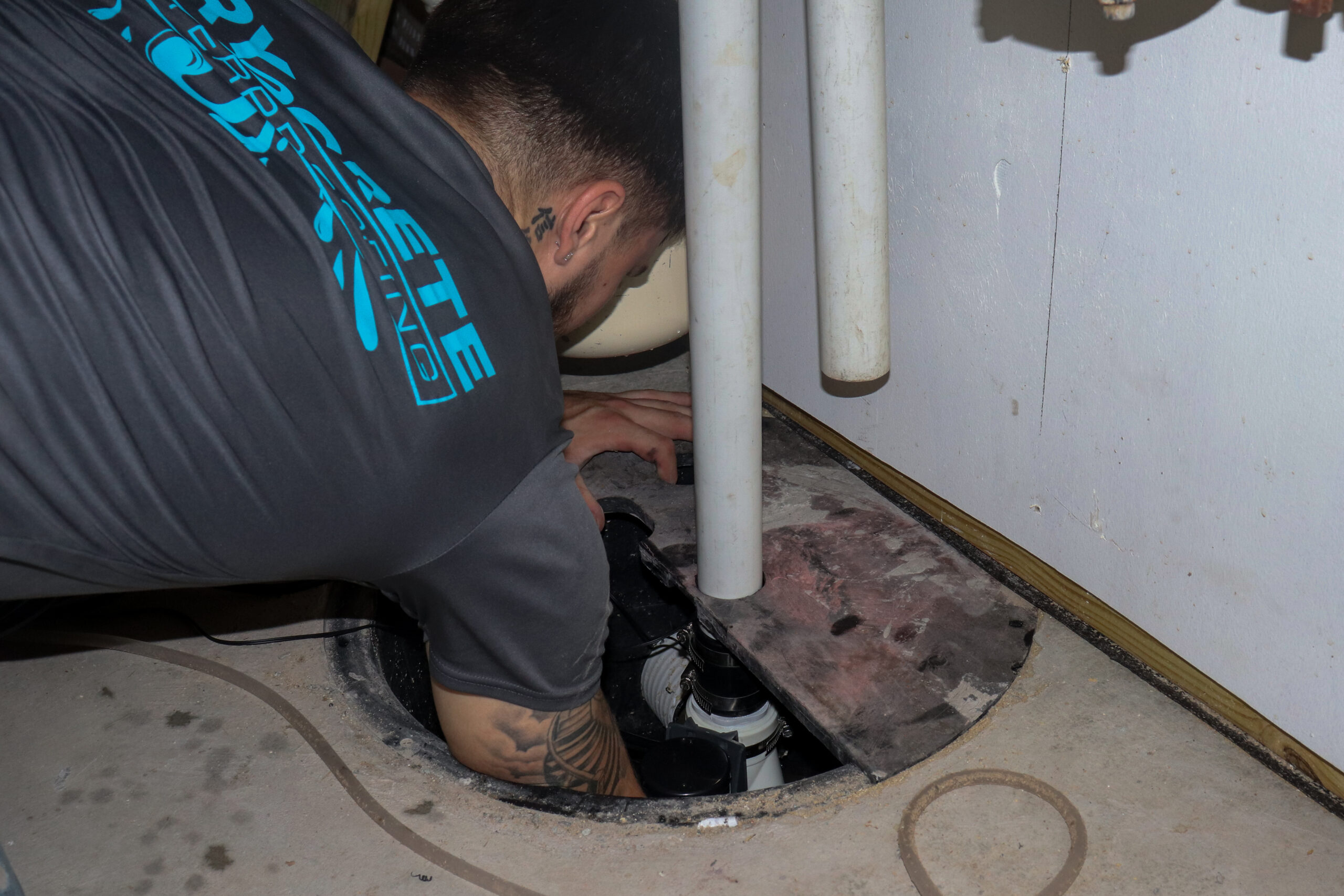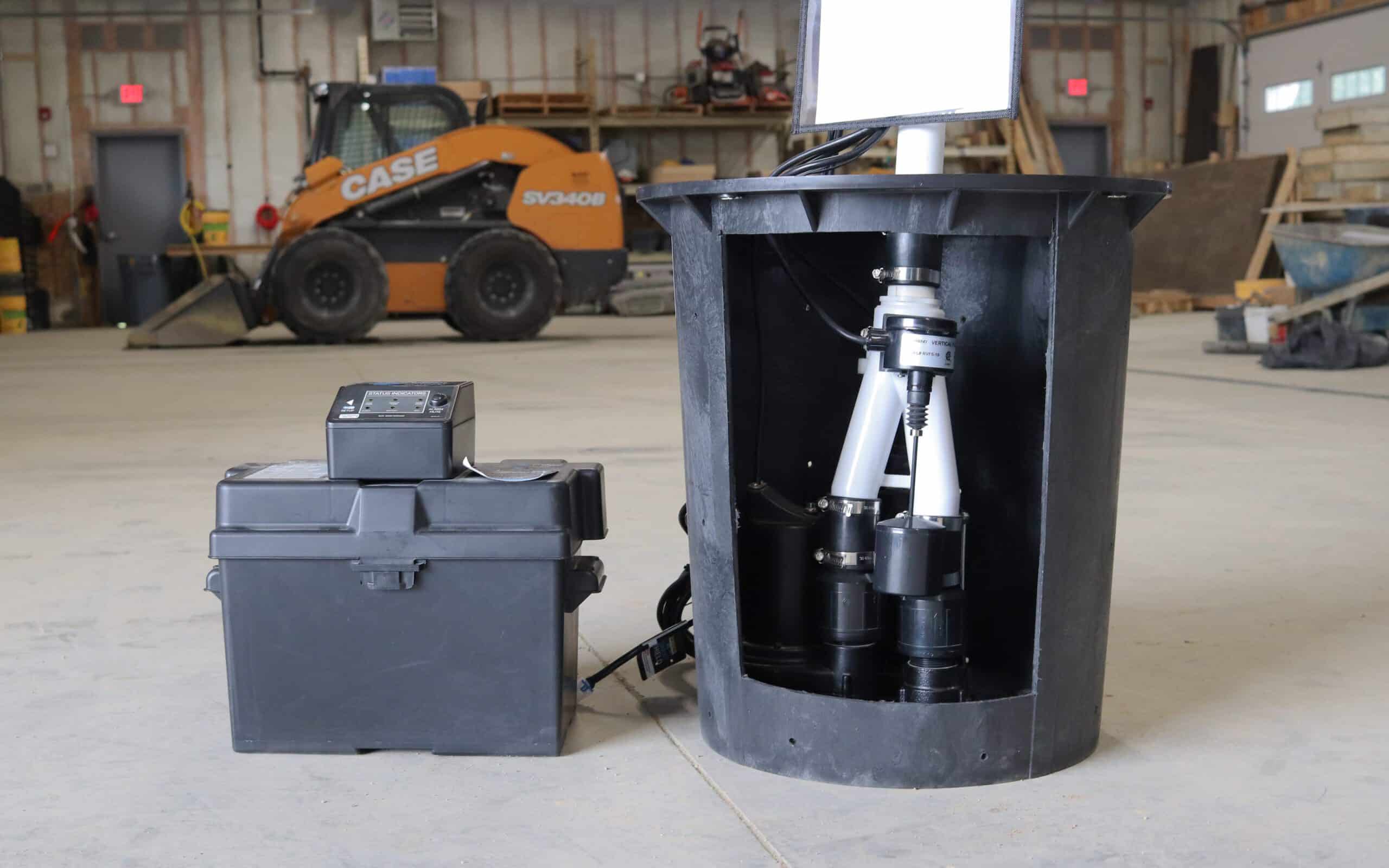It’s a depressing fact of life that nothing lasts forever and, unfortunately, sump pumps are no exception to this rule. There are things you can do to help extend their lives but eventually, even the best maintained system will need replacing. But how long do sump pumps last?
Understanding Sump Pumps
A sump pump is a simple mechanism which sits in a pit (the “sump”) under your basement floor. When the sump fills with water, a float-switch is activated and the pump turns on.
The pump consists of an impellor which, when turned on, spins, creating an area of low pressure within the pump and pushes water along the discharge line and away from your home.
Not all homes will benefit from a sump pump but if you live in an area with a high water-table, or one which is particularly prone to heavy rain, they can be an invaluable investment.
Factors Influencing Sump Pump Lifespan
If you’re wondering how long do sump pumps last. The answer is: it depends.
While you can probably expect to get 8-12 years out of the average pump, there are any number of factors which will have an effect on the lifespan of your sump pump; from the sturdiness and build quality to how often it’s turned on.
Some of the biggest factors effecting the lifespan of your basement water pump are:
1. Quality And Brand
You get what you pay for, as the old adage goes. Some sump pumps are built better than others, but are likely to set you back more during the initial installation. Whether or not this is a deciding factor on which model you choose depends on your personal circumstances at the time.
2. Usage Frequency
As a mechanical system with moving parts, eventually things will wear out. The more that your sump pump is in use, the faster that point will come.
If you find that it’s running nearly constantly it will have a shorter lifespan than a sump pump which is only activating occasionally.
3. Maintenance
Like anything else, taking proper care of your sump pump will expand its lifespan.
Keeping the sump covered, cleaning it out regularly to avoid debris finding its way into the system and keeping discharge lines clear will all help your sump pump work less hard and therefore last longer.
4. Installation
When it comes to installation, there are a number of pitfalls to be avoided.
While very few of these installation issues will mean your pump doesn’t work at all, they can make its work harder which will take their toll on the system.
On the flip side, a properly installed sump pump will perform better and last longer.
5. Environmental Factors
This is perhaps the biggest factor and, certainly the one which is most out of your control when it comes to determining how long your sump pump lasts.
Factors such as how often it rains, how close you are to rivers and lakes etc. will determine how often your pump runs. The more it runs, the shorter the lifespan and the sooner you’ll have to replace your sump pump.
Things like iron ochre and other impurities in your groundwater can build up within the pump mechanism, slowly throttling efficiency and eventually leading to total breakdown. Keeping on top of your maintenance schedule will help minimize these problems.
Signs Your Sump Pump Needs Replacement

Unfortunately, any mechanical system will eventually reach the end of its lifespan and need replacing and that goes for sump pumps too. But how do you know when your sump pump needs replacing?
Here are some telltale signs that it’s time to start considering a full replacement:
1. Age:
While it’s never a hard and fast rule, you can usually expect your sump pump to have a lifespan of between 8 and 12 years. As we discussed above, there are factors which will influence this, but about a decade (give or take) is a good rule of thumb.
If you start noticing problems around this time, it’s worth considering if repairs are really worth it over a full replacement.
2. Performance Issues
If you notice your sump is working harder than it should be, cycling up more often than it once did, making odd noises or struggling to cope with the water load finding its way into the sump, then it might be time to consider upgrading.
3. Visible Damage
As a metal object which sits in a pit full of water, it’s only a matter of time before a close inspection will show signs of rust and corrosion.
Once you start noticing physical damage to the system, it’s only a matter of time before you’ll find your sump pump clogging or jamming and failing entirely.
4. Energy Efficiency
Like all electrical systems, technology has moved on and continued to develop. If your home has an older model of sump pump, it might be time to consider an upgrade.
The newest pumps can offer significant efficiency gains, saving you money on your utilities bills as well as keeping your basement nice and dry.
Maintenance Tips To Extend Your Sump Pump’s Life

There are a few simple tasks that you can undertake to extend how long your sump pump lasts:
1. Regular Cleaning
Keeping your sump clear of debris and your discharge line free of blockages will avoid clogs and jamming, extending your sump pump’s lifespan considerably.
2. Testing
Testing your sump pump regularly will allow you to get ahead of any developing issues before you really need your pump working.
It’s simple to test your pump:
- Take a bucket and fill it with water.
- Pour it into your sump.
- The pump should switch on and the water-level should drop fairly quickly.
If it doesn’t or seems to be making noises, it’s time to call in a professional.
3. Battery Back-up
When are you most likely to need your sump pump in working order? During a storm. When is a power-cut most likely? During a storm.
Installing a battery back-up may not actually extend the lifespan of your sump pump, but it is an important maintenance task to get out of the way.
4. Professional Inspection
While you can certainly give your pump a once over yourself, sometimes it’s best to get an expert eye to take a glance.
Scheduling an annual inspection from a professional will ensure that you know everything is in working order and head-off problems before they become critical.
Choosing a Replacement Sump Pump

Eventually the inevitable will happen and it will be time to consider your options for a replacement sump pump.
There are a number of factors to take into account when choosing a replacement pump and which you should place the most emphasis on is down to your personal circumstances. Here are a few things to consider:
1. Costs:
There’s no getting around it, cost is always an issue with home maintenance. Whether you decide to opt for a simpler, cheaper model over an all-singing-all-dancing one which costs more is up to you.
That being said, it can often be a false economy to opt for the cheapest when you factor in running costs, increased maintenance, decreased performance and shorter lifespans.
2. Capacity:
If your previous pump seemed to be working too hard or failed to keep the water-levels down, then it’s worth considering if any replacement should be larger.
With extreme weather events and storms becoming more frequent, it’s always worth considering if your current system is futureproof.
3. Power Source:
Sump pumps are electrical appliances and, unfortunately, that makes them susceptible to power-failures. Ironically, you’re most likely to need your pump to be working at exactly the time they’re most likely to be suffering from a lack of power.
Built in battery backups are a great idea for any sump pump and many modern models come with them built in.
In Conclusion:
While your sump pump will eventually wear out and stop working, with proper maintenance and common sense, there’s plenty you can do to expand their lifespans and ensure that they provide you with a nice, dry basement for years to come.
When the inevitable does happen and it’s time to replace, it’s worth getting a professional in to discuss your options and ensure that the new installation goes smoothly.

